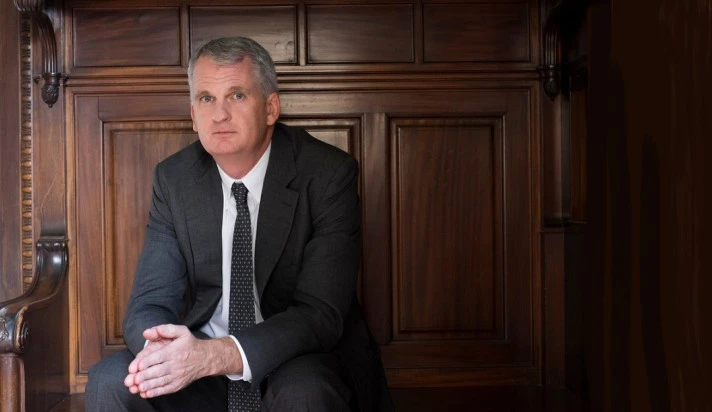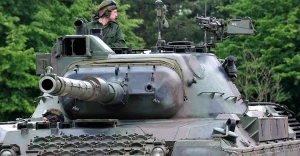
Wagner was able to make Putin regime work for it. Historian Timothy Snyder explains Prigozhin’s "march of justice" to Moscow
Putin is not popular, the division is real, top participants were fascists, this was a preview of how the war in Ukraine ends – Timothy Snyder, Professor of History at Yale University, has drawn 10 conclusions from the mercenary chief’s mutiny and its sudden end
On June 23, a military coup started in Russia under the leadership of Yevgeny Prigozhin, the founder of the Wagner PMC. The Russian FSB even managed to initiate a criminal case against him and introduce the Fortress plan. On June 24, on their way to Moscow, the Wagner fighters entered Rostov-on-Don and occupied military facilities in Voronezh. But around 9 p.m., Prigozhin announced that the mercenary columns were turning around.
In a column on substack, historian Timothy Snyder draws 10 conclusions about the reasons for the mutiny, its implications for the Putin regime and Russia, and whether it is a wake-up call for the beginning of the collapse of Russia as a state.
“Often there are plots without a coup; this seemed like a coup without a plot. Yet weird as the mercenary chief’s mutiny was, we can draw some conclusions from its course and from its conclusion,” Snyder says at the beginning of his new article. Below we publish excerpts from his analytical overview.
1. Putin is not popular.
When Putin’s power was lifted, as when the city of Rostov-on-Don was seized by Wagner, no one seemed to mind. Reacting to Prigozhin's mutiny, some Russians were euphoric, and most seemed apathetic.
The euphoria suggests to me that some Russians are ready to be ruled by a different exploitative regime. The apathy indicates that most Russians just take for granted that they will be ruled by the gangster with the most guns, and will just go on with their daily lives regardless of who that gangster happens to be.
2. Prigozhin was a threat to Putin, because he does much the same things that Putin does, and leverages Putin's own assets.
Both the Russian state itself and Prigozhin's mercenary firm Wagner are extractive regimes with large public relations and military arms.
Wagner functioned as a kind of intensification of the Russian state, doing the dirtiest work beyond Russia, not only in Syria and Ukraine but also in Africa. It was subsidized by the Russian state, but made its real money by extracting mineral resources on its own, especially in Africa. Unlike most of its other ventures, Wagner's war in Ukraine was a losing proposition.
Bakhmut was the only gain in Russia's horrifyingly costly but strategically senseless 2023 offensive, so it had to be portrayed by Putin's media as some kind of Stalingrad or Berlin. Prigozhin took advantage of this. He was able to direct the false glory to himself even as he then withdrew Wagner from Ukraine.
“Meanwhile he criticized the military commanders of the Russian Federation in increasingly vulgar terms, thereby preventing the Russian state (and Putin) from gaining much from the bloody spectacle of invaded Ukraine. In sum: Wagner was able to make the Putin regime work for it.”
3. Prigozhin told the truth about the war.
I'm not sure enough attention has been paid to what Prigozhin said about Putin's motives for war: that it had nothing to do with NATO enlargement or Ukrainian aggression, and was simply a matter of wishing to dominate Ukraine, replace its regime with a Moscow-friendly politician (Viktor Medvedchuk), and then seize its resources and to satisfy the Russian elite.
4. Russia is far less secure than it was before invading Ukraine.
This is a rather obvious point that many people aside from myself have been making, going all the way back the first invasion of 2014. There was never any reason to believe, from that point at the latest, that Putin cared about Russian national interests. If he had, he would never have begun a conflict that forced Russia to become subordinate to China, which is the only real threat on its borders.
Prigozhin's march shows that a small force would have little trouble reaching Moscow. That was not the case before most of the Russian armed forces were committed in Ukraine, where many of the best units essentially ceased to exist.
5. When backed into a corner, Putin saves himself.
In the West, we worry about Putin's feelings. What might he do if he feels threatened? Might he do something terrible to us? Putin encourages this line of thinking with constant bluster about "escalation" and the like.
“On Saturday Putin gave another speech full of threats, this time directed against Prigozhin and Wagner. Then he got into a plane and flew away to another city. And then he made a deal with Prigozhin. And then all legal charges against Prigozhin were dropped. And then Putin's propagandists explained that all of this was perfectly normal.”
So long as Putin is in power, this is what he will do. He will threaten and hope that those threats will change the behaviour of his enemies.
6. The top participants were fascists, and fascists can feud.
if Russia today is not a fascist regime, it is really difficult to know what regime would be fascist. It is more clearly fascist than Mussolini's Italy, which invented the term. Russian fascists have been in the forefront of both invasions on Ukraine, both on the battlefield and in propaganda. Putin himself has used fascist language at every turn, and has pursued the fascist goal of genocide in Ukraine.
Prigozhin has been however the more effective fascist propagandist during this war, strategically using symbols of violence (a sledgehammer) and images of death (cemeteries, actual corpses) to solidify his position. Wagner includes a very large number of openly fascist fighters. Wagner's conflict with Shoigu has racist overtones, undertones, and throughtones -- on pro-Wagner Telegram channels he is referred to as "the Tuva degenerate" and similar.
“It is absolutely clear that many Russians were deeply affected by the clash of the two fascist camps. That said, it is important to specify a difference between Putin and Prigozhin's fascism and that of the 1930s. The two men are both very concerned with money, which the first generation of fascists in general were not. They are oligarchical fascists -- a breed worth watching here in the US as well.”
7. The division in Russia was real, and will likely endure.
Some Russians celebrated when Wagner shot down Russian helicopters, and others were astonished that they could do so. Some Russians wanted action, others could not imagine change. Most Russians probably do not care much, but those who do are not of the same opinion. Putin's regime will try to change the subject, as always, but now it lacks offensive power in Ukraine (without Wagner) and so the ability to create much of a spectacle.
Putin now faces a bad choice between toleration and purges. If he tolerates the rebellion, he looks weak. If he purges his regime, he risks another rebellion.
8. One of Putin's crimes against Russia is his treatment of the opposition.
This might seem to be a tangent: what does the imprisoned or exiled opposition have to do with Prigozhin's mutiny? The point is that their imprisonment and exile meant that they could do little to advance their own ideas for Russia's future on what would otherwise have been an excellent occasion to do so. The Putin regime is obviously worn out, but there is no one around to say so, and to propose something better than another aging fascist.
9. This was a preview of how the war in Ukraine ends.
When there is meaningful conflict in Russia, Russians will forget about Ukraine and pay attention to their own country. That has not happened once, and it can happen again.
“When such a conflict lasts longer than this one (just one day), Russian troops will be withdrawn from Ukraine. In this case, Wagner withdrew itself from Ukraine, and then the troops of Ramzan Kadyrov (Akhmat) departed Ukraine to fight Wagner. In a more sustained conflict, regular soldiers would also depart. It will be impossible to defend Moscow and its elites otherwise.”
10. Events in Russia (like events in Ukraine) are in large measure determined by the choices of Russians (or Ukrainians).
In the US we have the imperialist habit of denying agency to both parties in this conflict. Far too many people seem to think that Ukrainians are fighting because of the US or NATO, when in fact the situation is entirely the opposite: it was Ukrainian resistance that persuaded other nations to help. Far too many people still think the US or NATO had something to do with Putin's personal decision to invade Ukraine, when in fact the character of the Russian system (and Putin's own words) provide us with more than enough explanation.
Some of those people are now claiming that Prigozhin's putsch was planned by the Americans, which is silly.
Оthers are scrambling to explain Prigozhin's march on Moscow and its end as some kind of complex political theater, in which the goal was to move Prigozhin and Wagner to Belarus to organize a strike on Ukraine from the north. This is ludicrous. If Putin and Prigozhin were on cooperative terms, they could have simply agreed on such a move in a way that would not have damaged both of their reputations (and left Russia weaker).
Putin chose to invade Ukraine for reasons that made sense to him inside the system he built. Prigozhin resisted Putin for reasons that made sense to him as someone who had profited from that system from the inside. The mutiny was a choice within Putin's war of choice, and it exemplifies the disaster Putin has brought to his country.
- News














































